Face mask scam targeting U.S. consumers on Facebook exploits racial justice protests
Company created over a dozen fake
Face mask scam targeting U.S. consumers on Facebook exploits racial justice protests
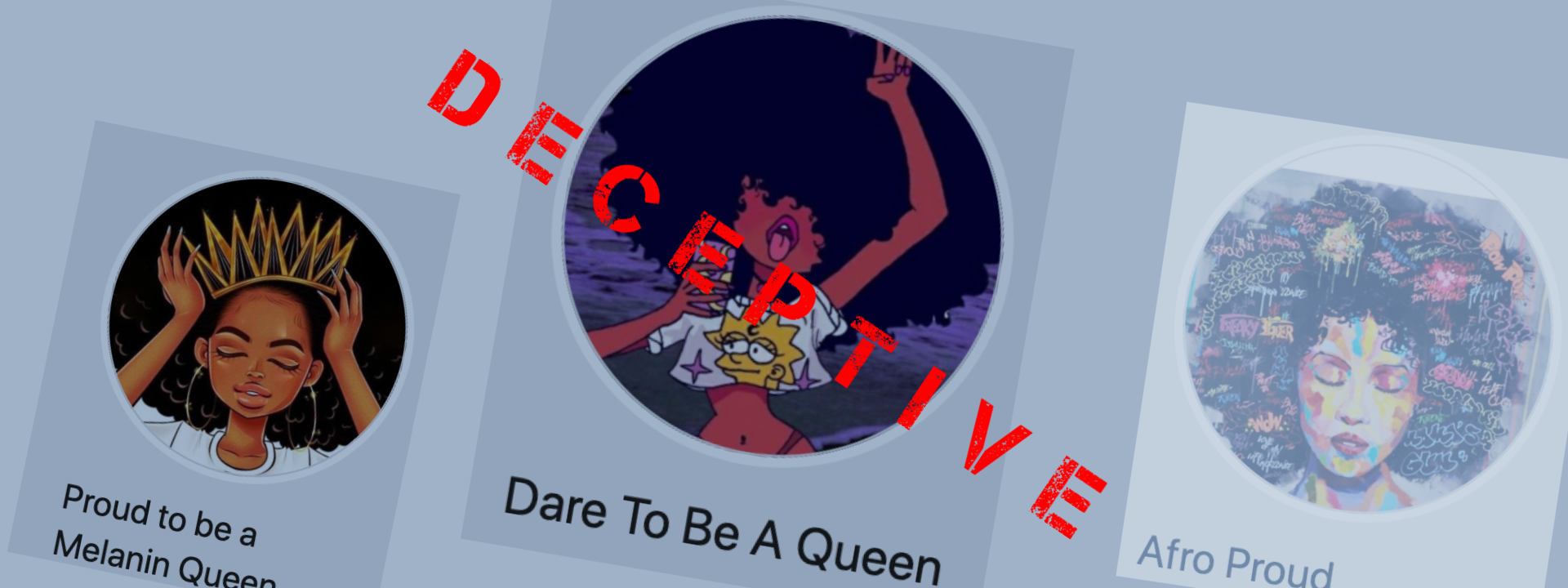
Company created over a dozen fake Facebook pages to serve ads to U.S. consumers for Black Lives Matter-themed face masks
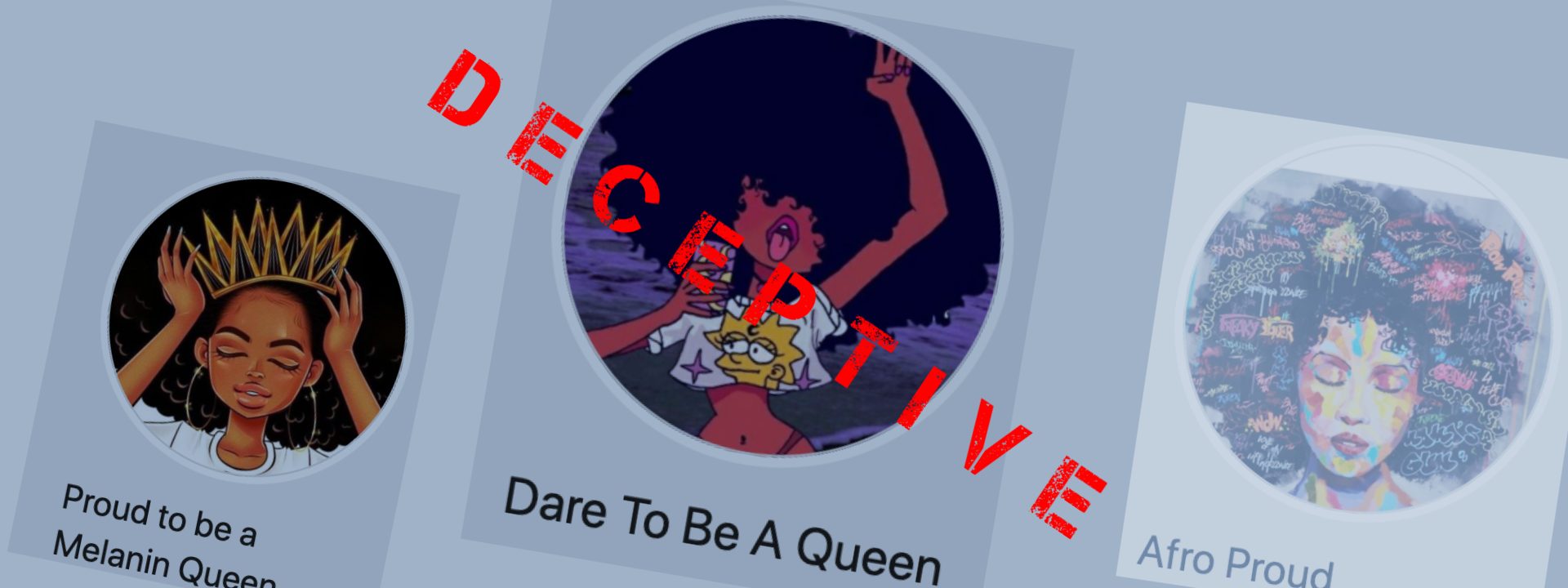
Hyperfavor, a Vietnam-based clothing and accessories company, ran a deceptive Facebook ad campaign posing as independent racial justice-centered clothing brands in an effort to profit off of both the George Floyd protests and the coronavirus pandemic. In total, the DFRLab identified over 20 Facebook pages created for the express purpose of running a sponsored Facebook ad campaign, which focused exclusively on promoting Hyperfavor’s line of racial justice-themed face masks.
In response to the DFRLab’s investigation, Facebook removed the pages involved in the ad campaign because they “used deceptive tactics to mislead people about their identity to drive people to websites selling merchandise,” according to a Facebook spokesperson.
The research community has devoted considerable attention to ideologically motivated disinformation, particularly the Russian Internet Research Agency’s covert influence efforts in 2016, targeting the Black Lives Matter movement and the broader campaign for racial justice. A considerable portion of the attempts to co-opt the movement is not the work of foreign governments seeking out ideological gain, but is instead the work of scammers seeking to profit off of the activist community for a quick buck. In 2018, a CNN investigation uncovered that the largest Black Lives Matter page on Facebook was fake. It was not run by nefarious foreign government entities to sow racial discord in the United States but by a white Australian man operating a lucrative fundraising scam that claimed to be devoted to the cause.
Ads, ads, everywhere
Most of the pages were created between May 12 and June 8, 2020 (with the exception of one, which was created in November 2019) in a likely attempt to capitalize on the ongoing mass protests across the United States against police brutality and racial injustice. Of the 22 pages the DFRLab identified, six were created on a single date: May 12, 2020. While this was before the protests spurred by the killing of George Floyd began in earnest, it was around the time that a series of fatal shootings of unarmed black people began, once again, to receive national attention.
The pages appeared to be deliberately named to create the false impression that these were independent black-owned businesses (as some users encountering them indicated), with names such as “Afro Proud,” “Melanin Beauty,” and “Black and Boujee.”
They all uploaded an initial profile picture and a cover photo, and never posted again.
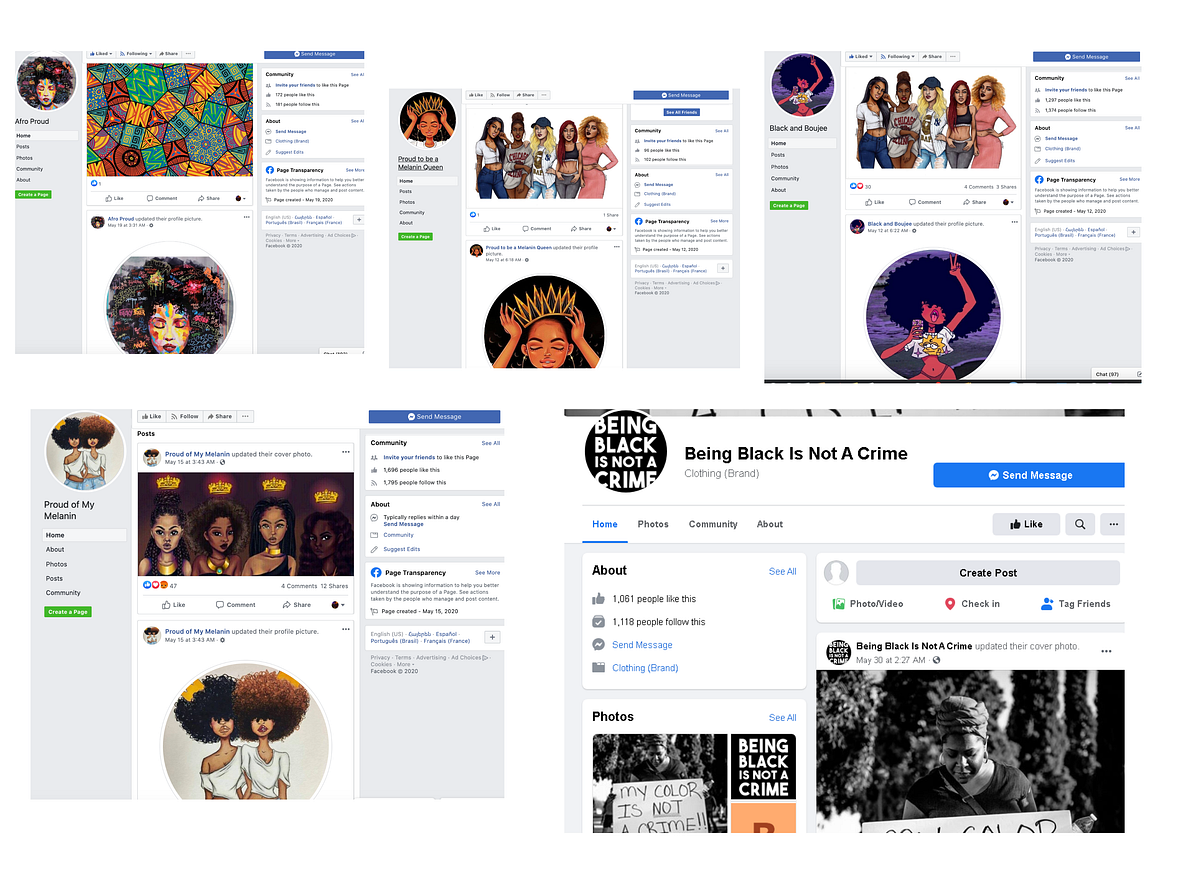
Despite posting so little, the pages ran an aggressive sponsored Facebook ad campaign to sell racial justice-themed, non-medical face masks. The DFRLab counted well over 100 ads, both active and inactive, for face masks across all of the pages. One page, “Afro Proud,” was running 50 active ads alone. In the comments under many of the ads, Facebook users asked if the businesses were black-owned.
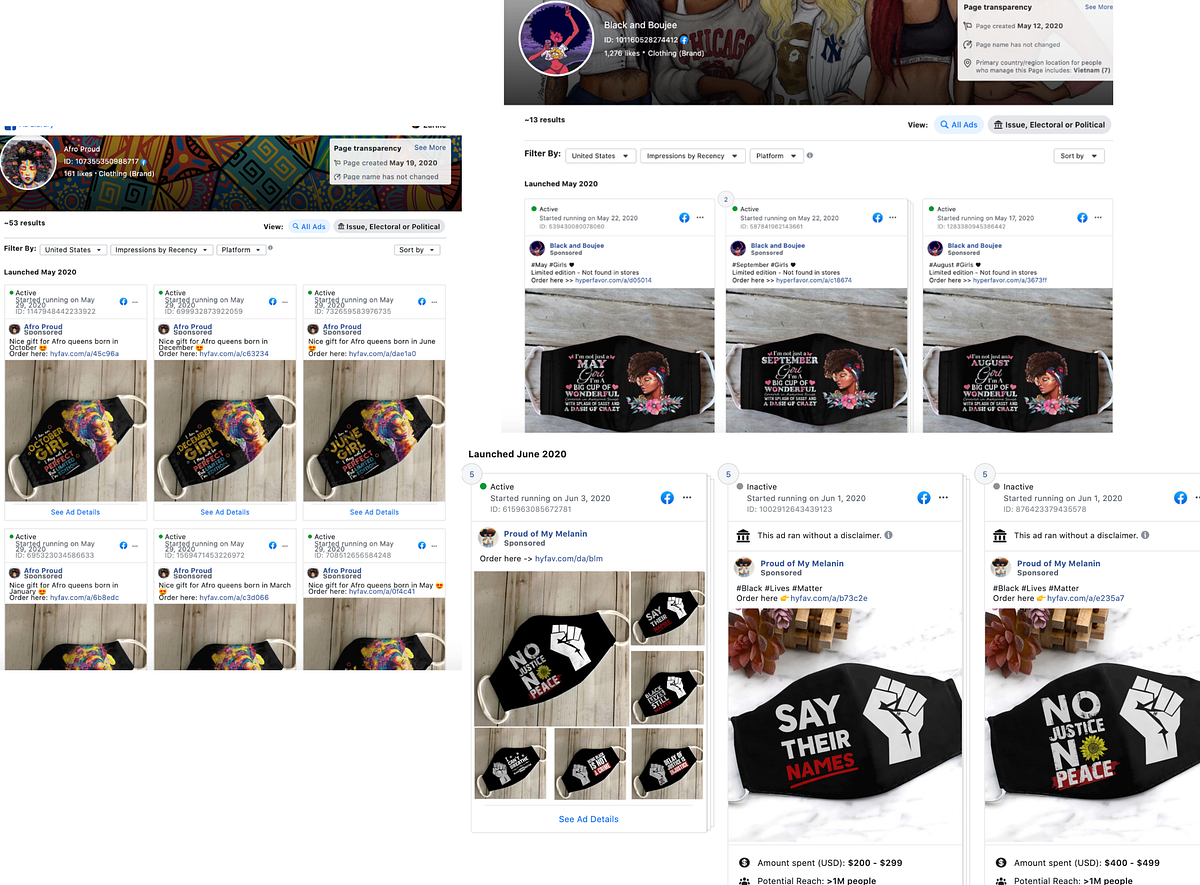
At first glance, the pages appeared independent, but the ads all linked to an online clothing retailer, Hyperfavor.com, that sells a dizzying array of face masks and graphic tees branded with various causes including “Black Lives Matter,” as well as its counter-slogan, “All Lives Matter.”
A reverse image search showed that the models featured on the Hyperfavor website were stock images taken from other websites with masks photoshopped on.
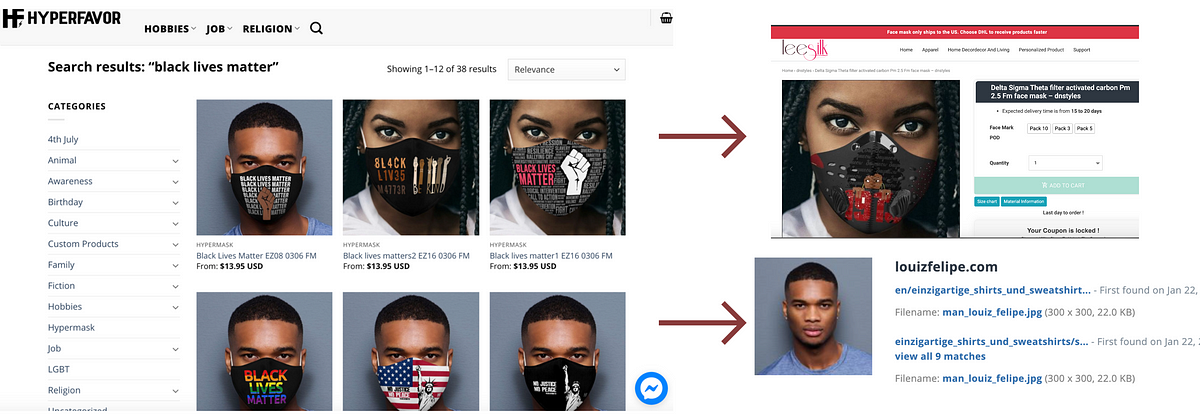
There was little website registration information available for Hyperfavor.com, both because the domain was registered recently, on March 3, 2020, and because registration information was masked from the beginning.
Thousands of ad dollars spent
While Facebook’s Ad Library did not display data for each ad, some of the inactive ads included information on targeting, like the below ad from the inauthentic page “Being Black Is Not a Crime.” The total cost of the ad campaign was not available, but a single ad appeared to cost anywhere from $300 to $1,500 and regularly received hundreds of thousands of impressions. The ads appeared to be primarily aimed at millennial men and women.
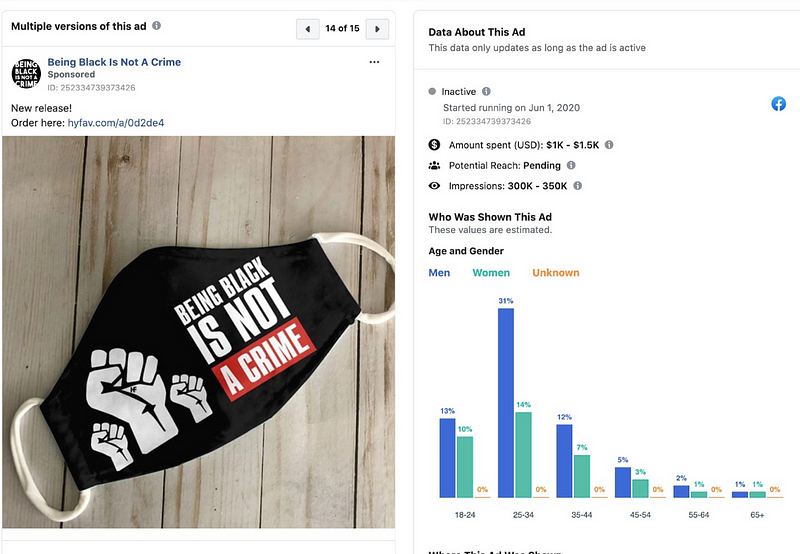

Because the Facebook pages had never posted any material after uploading the minimal profile information and were so recently created, the usual social listening tools researchers used to discover inauthentic pages, such as CrowdTangle, were of little use here. Luckily, however, the ad campaign was so aggressive that, upon viewing one of the inauthentic pages, other ads run by the network appeared in the author’s Facebook newsfeed.
From 9:35 a.m. to 9:47 p.m. — a span of 12 minutes — four separate pages running the ads appeared in the author’s newsfeed.
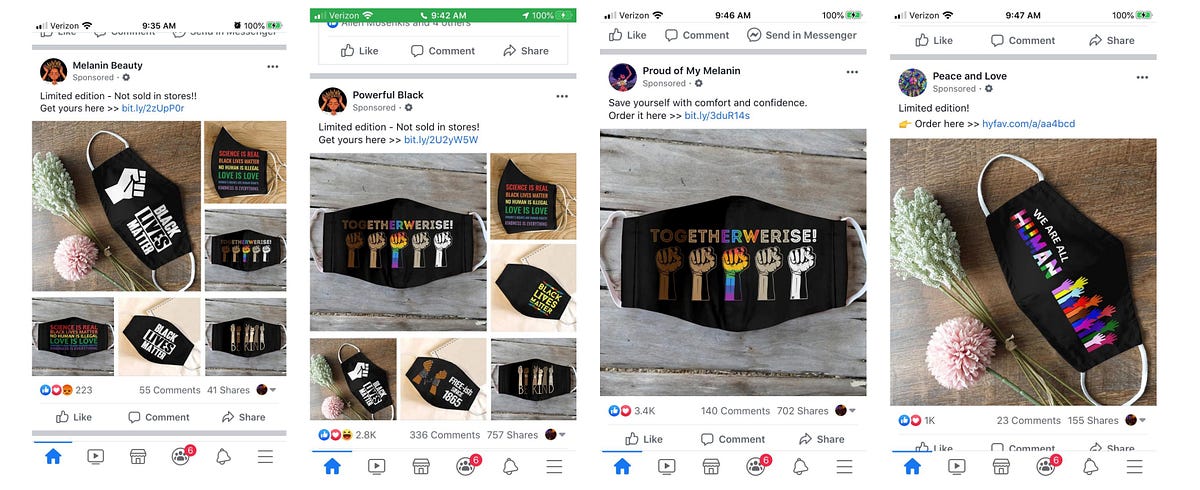
The frequency with which targeted ads by the network appeared after the author viewed just one, coupled with the evidence that each page was likely spending a few thousand dollars, suggested that Hyperfavor was running a rather aggressive ad campaign.
A failing grade from the Better Business Bureau
On business trust ratings site Better Business Bureau (BBB), Hyperfavor scored an appalling “F,” the lowest score, for having 10 complaints filed against it by customers, failing to respond to eight of those complaints, and given the short length of time the business has been operating.
While a few accounts left rave reviews, the majority reported that they had ordered masks or another product from the website but had either never received the order or did not receive what they expected. “I ordered Masks from this company on 4/19/20 and still have not received them,” one customer reported on May 31. “Over a month ago I ordered facemasks. The advertisement came across my [news]feed,” another said. “I was provided one shipping updated..on MAY 12th. The phone number listed has no official recording. I believe this company is a scam!”
BBB, Hyperfavor.com, and the company’s main Facebook page (created on May 4, 2020) all list an address for the company in Sheridan, Wyoming. There is no business entity under the name Hyperfavor registered in Wyoming, however, and all of the inauthentic Black pride-themed pages running ads for the company’s products are managed by page managers based in Vietnam.
There has been an uptick in reports of scam websites claiming to sell facemasks online in order to capitalize on skyrocketing demand amid the pandemic. A post on the Federal Trade Commission’s website, the primary U.S. government agency responsible for consumer protection, explained how these scams work: “Most people said the scammers took their money and then ghosted them by cutting off all contact, refusing to answer questions, or closing or deactivating their online store websites.”
On public business ratings sites as well as on social media, the DFRLab found dozens of comments from consumers accusing Hyperfavor of ghosting them after they provided their credit card information. A recent BBB Scam Alert warned, “In the worst cases, these sites are actually a way to steal your personal and credit card information, opening you up to identity theft.”
As the protests in the United States continue amid a pandemic that has severely affected small businesses, people have rallied to support black-owned businesses. Many independent businesses have also pledged sizable donations to Black Lives Matter chapters, bail funds, and other organizations fighting racial injustice. It appears that online scammers, however, are also exploiting these expressions of solidarity by presenting themselves as black-owned brands committed to advancing the cause of racial justice — and ensnaring unsuspecting consumers in the process.
Zarine Kharazian is Assistant Editor with the Atlantic Council’s Digital Forensic Research Lab (@DFRLab).
Follow along for more in-depth analysis from our #DigitalSherlocks.

